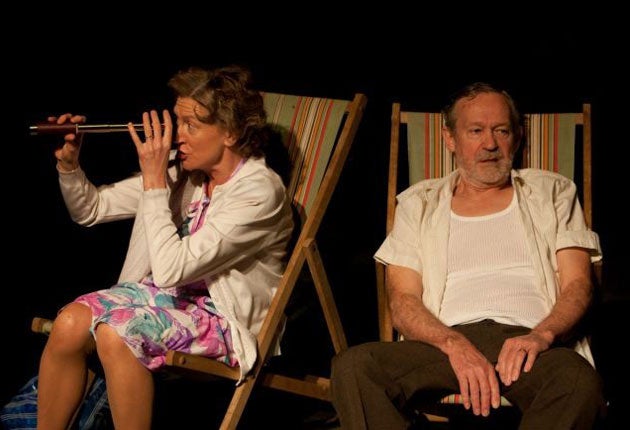Winterlong, Soho Theatre, London
Hope floats, just, in this brutal debut

Your support helps us to tell the story
From reproductive rights to climate change to Big Tech, The Independent is on the ground when the story is developing. Whether it's investigating the financials of Elon Musk's pro-Trump PAC or producing our latest documentary, 'The A Word', which shines a light on the American women fighting for reproductive rights, we know how important it is to parse out the facts from the messaging.
At such a critical moment in US history, we need reporters on the ground. Your donation allows us to keep sending journalists to speak to both sides of the story.
The Independent is trusted by Americans across the entire political spectrum. And unlike many other quality news outlets, we choose not to lock Americans out of our reporting and analysis with paywalls. We believe quality journalism should be available to everyone, paid for by those who can afford it.
Your support makes all the difference.Winterlong, a debut play by the Mancunian actor Andrew Sheridan, won the prestigious Bruntwood Award in 2008. It's patently the work of an impressive new talent, but I found myself in two minds about it. There are scenes that could scarcely be improved on as raw, piercingly poetic dramatisations of the perverse, intractable difficulty of expressing – or indeed, at key moments, even of feeling – love for the people to whom, at the most primitive level, we are connected. But the apocalyptic setting struck me as rather facile and all-purpose – not so much a case of Apocalypse Now as of ready-made, on-tap Apocalypse Whenever.
The story is simple but the method of telling it goes for broke in its uninhibited, non-naturalistic expressiveness. Howard Barker's characters sound like a bunch of tongue-tied wallflowers by comparison with those of Sheridan. Baby Oscar is dumped by his dysfunctional young parents on the parents of his mother, just at the point when the last of love was gurgling down the plughole of their marriage. We then follow Oscar – a shy, sensitive boy, older-than-his-years and superbly portrayed by Harry McEntire in a performance that is as emotionally transparent as a blush – through misadventures of affection that leave him purified, so to speak, of false expectations and so poised by the end in stoical, tentative hope.
It's a play that wears it heart on its sleeve and its influences on its lapel. Edward Bond is in the vicinity of the gut-wrenching scene where the grandfather (a flinty but vulnerable Paul Copley) devotedly builds Oscar a bird-table, only to hammer it to pieces and to tell the boy that no one has ever loved him, when his own grief and rage at the contagion of lovelessness within the family becomes insupportable. The work of Robert Holman seems to have inspired what is, for me, the best scene, when the lonely, eight-year-old Oscar, while birdwatching in a graveyard, reaches out in friendship to a young man whose intentions towards him may be far from honourable. It's a brilliantly written episode of queasy equipoise. Laurence Mitchell subtly shows you the painful self-mistrust of the paedophilic young man, establishing how (in a way) neither of these needy people want to play the kinky forfeit game the older one has instigated and that only Oscar's flash of clairvoyance about the man's married status serves to prevent.
The play swills and swirls with more piss, shit, bile and dead creatures than a canal-flooded abattoir. In a well-acted production by Sarah Frankcom, Amanda Stoodley's design cramps the action awkwardly with its over-obtrusive shelves of family clutter sheathed in prophylactic polythene. As I said at the start, the apocalyptic atmosphere (cue sounds of distant gunfire, the escalating scream of bombs and some vague fog) feels a bit under-earned – the misery of others on the planet turned to metaphor. That caveat aside, the play unfolds as a brutally beautiful tone poem, whose opening is in harmony with its close. His pregnant teenage mother's chance encounter with a strange boy at the start results in his being named Oscar. At the end, on his 15th birthday, Oscar gives equivalent help to a strange girl. In such symmetry, gentle optimism.
To 12 March (020 7478 0100)
Join our commenting forum
Join thought-provoking conversations, follow other Independent readers and see their replies
Comments